|
|
|
Sort Order |
|
|
|
Items / Page
|
|
|
|
|
|
|
| Srl | Item |
| 1 |
ID:
138341
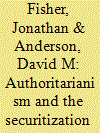

|
|
|
|
|
| Summary/Abstract |
Debate on the ‘securitization’ of aid and international development since 9/11 has been anchored in two key claims: that the phenomenon has been driven and imposed by western governments and that this is wholly unwelcome and deleterious for those in Africa and elsewhere in the developing world. This article challenges both of these assumptions by demonstrating how a range of African regimes have not only benefited from this dispensation but have also actively encouraged and shaped it, even incorporating it into their own militarized state-building projects. Drawing on the cases of Chad, Ethiopia, Uganda and Rwanda—four semi-authoritarian polities which have been sustained by the securitization trend—we argue that these developments have not been an accidental by-product of the global ‘war on terror’. Instead, we contend, they have been the result of a deliberate set of choices and policy decisions by these African governments as part of a broader ‘illiberal state-building’ agenda. In delineating this argument we outline four major strategies employed by these regimes in this regard: ‘playing the proxy’; simultaneous ‘socialization’ of development policy and ‘privatization’ of security affairs; making donors complicit in de facto regional security arrangements; and constructing regime ‘enemies’ as broader, international threats.
|
|
|
|
|
|
|
|
|
|
|
|
|
|
|
|
| 2 |
ID:
104443
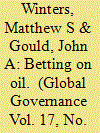

|
|
|
|
|
| Publication |
2011.
|
| Summary/Abstract |
Can international donors ensure that poor countries spend their natural resource revenues on development? This article reviews the Chad-Cameroon Oil Pipeline Project and the World Bank's fourteen-year effort to foster pro-poor expenditure of resource revenues in Chad. The World Bank used its leverage as a gatekeeper of private sector oil investment to write fiscal restrictions and extragovernmental oversight into Chadian law. These efforts, however, were not sufficient to overcome the country's poor governance and weak political accountability. The article argues that external donor efforts to build better governance in undemocratic states are unlikely to overcome resource curse and obsolescing bargain dynamics. They may even do more harm than good. The article recommends that the World Bank implement the 2003 Extractive Industry Review suggestion to cease investing in oil production. If the Bank does continue to lend to countries like Chad, it must ensure that it retains leverage across the life of the project in order to achieve its goals.
|
|
|
|
|
|
|
|
|
|
|
|
|
|
|
|
| 3 |
ID:
185760


|
|
|
|
|
| Summary/Abstract |
On April 20, 2021, as he was preparing to commence his sixth term in office, it was officially announced that Chadian President Idriss Déby Itno had died on the battlefield. He was immediately and unconstitutionally replaced by his son, General Mahamat Idriss Déby, at the head of a fourteen-strong transitional military council, to great international acclaim. This contribution attempts to spell out what this series of events and Déby’s career can tell us about current Chadian politics and the nature of the Chadian state more generally.
|
|
|
|
|
|
|
|
|
|
|
|
|
|
|
|
| 4 |
ID:
129615
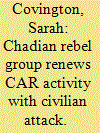

|
|
|
| 5 |
ID:
165664
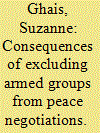

|
|
|
|
|
| Summary/Abstract |
This article examines the relationship between inclusion/exclusion of armed groups and the achievement of durable peace, using process tracing in two case studies: the peace process between the government of Chad and the rebel group Movement for Democracy and Justice in Chad, and the one between the government of the Philippines and the Moro National Liberation Front. The cases support theoretical arguments that excluded armed actors are more likely to renew armed confrontation after the peace accord. The study further elaborates the causal link: included armed rebels tend to negotiate for private benefits such as government posts and amnesty but also moderate their stances and emerge committed to the agreement; excluded armed actors lack any such commitment and still have unresolved grievances. They are thus more likely to renew armed action against the government.
|
|
|
|
|
|
|
|
|
|
|
|
|
|
|
|
| 6 |
ID:
072843
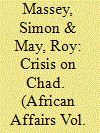

|
|
|
| 7 |
ID:
142394
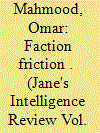

|
|
|
| 8 |
ID:
105038
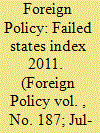

|
|
|
|
|
| Publication |
2011.
|
| Summary/Abstract |
The new edition of the index draws on some 130,000 publicly available sources to analyze 177 countries and rate them on 12 indicators of pressure on the state during the year 2010 -- from refugee flows to poverty, public services to security threats. Taken together, a country's performance on this battery of indicators tells us how stable -- or unstable -- it is. And the latest results show how much the 2008 economic crisis and its ripple effects everywhere, from collapsing trade to soaring food prices to stagnant investment, are still haunting the world.
|
|
|
|
|
|
|
|
|
|
|
|
|
|
|
|
| 9 |
ID:
106965
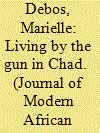

|
|
|
|
|
| Publication |
2011.
|
| Summary/Abstract |
This article explores men in arms' conceptions of armed violence in a country which has been prone to a violent cycle of rebellion and repression. Based on ethnographic research in Chad, it analyses combatants' life trajectories in an unstable political environment and a militarised economy. It moves beyond rebellion towards an analysis of the most mundane patterns of the activities conducted by men in arms, to understand what is at stake beyond times and spaces of war. It argues that armed violence is an ordinary way of expressing contestation, as well as a practical occupation or métier, a French word that indicates a non-institutionalised profession.
|
|
|
|
|
|
|
|
|
|
|
|
|
|
|
|
| 10 |
ID:
164146
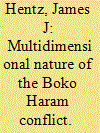

|
|
|
|
|
| Summary/Abstract |
The debate concerning the Nigerian terrorist Boko Haram is typically simplified across two false dichotomies. First, it is treated as either a local conflict in northeast Nigeria with its epicentre in Borno State or part of a broader conflict in Northwest Africa (and beyond), encompassing northern Cameroon, southern Chad, Niger, and reaching into Libya and Mali. The second dichotomy concerns whether it is animated by local material conditions on the ground, or is part of a broader anti-West jihad. The Boko Haram insurgency is not that simple. It is, rather, a multidimensional conflict and can change overtime.
|
|
|
|
|
|
|
|
|
|
|
|
|
|
|
|
| 11 |
ID:
189272
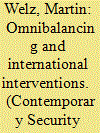

|
|
|
|
|
| Summary/Abstract |
This article studies why authoritarian states participate in international interventions. Troop contributions of such states indicate the support of authoritarian leaders for a liberal-cosmopolitan order that entails the protection of human rights internationally, while they deny such rights to their own citizens. I focus on the decisions of Chad’s long-term president Idriss Déby Itno to take an active stance in various international interventions. The analysis builds on the theory of omnibalancing, which holds that authoritarian leaders balance external and internal threats to ensure their survival. I demonstrate how Déby used troop deployment as part of his omnibalancing strategy. It allowed him to stay in power until his death in 2021 and made Chad’s democratization unlikely. For Déby’s omnibalancing not only quelled the domestic opposition and silenced international critique against the authoritarian rule, but also contributed to the securitization of the state.
|
|
|
|
|
|
|
|
|
|
|
|
|
|
|
|
| 12 |
ID:
164147
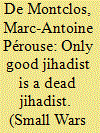

|
|
|
|
|
| Summary/Abstract |
This article discusses the shortcomings of the “de-radicalization doctrine” in sub-Saharan Africa. The issues raised are illustrated by the war against Boko Haram, which involves Nigeria, Niger, Chad and Cameroon. Relying on interviews with security officers, insurgents, civil servants, displaced people, humanitarian workers and Muslim and Christian clerics in Nigeria, Niger and Chad since 2005, the investigation shows that the four states focused on repression rather than demobilisation programs in prison or outdoors. The Boko Haram crisis is mainly a story of mismanagement. The article thus challenges the assumptions of the “de-radicalization doctrine” in Muslim Africa South of the Sahara. First, attempts to de-radicalize jihadi terrorists tend to focus too much on religious fanaticism and the exegesis of the Quran. Secondly, they are neither feasible nor efficient. Finally, they obscure priorities that are more important to counter extremism and demobilize insurgents.
|
|
|
|
|
|
|
|
|
|
|
|
|
|
|
|
| 13 |
ID:
141131
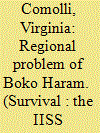

|
|
|
|
|
| Summary/Abstract |
‘Boko Haram is a typical example of small fires causing large fires’, declared retired general Muhammadu Buhari in his inaugural speech as Nigeria’s new president on 29 May 2015. The analogy was apt. From its inception in the early 2000s, the group has evolved from an isolated, broadly non-violent sect to a brutal, Islamist insurgency engaged in terrorism and criminality.
|
|
|
|
|
|
|
|
|
|
|
|
|
|
|
|
| 14 |
ID:
129325
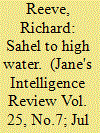

|
|
|
| 15 |
ID:
171711
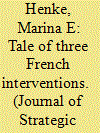

|
|
|
|
|
| Summary/Abstract |
What factors explain the institutional shape of military interventions spearheaded by France? This article suggests that Intervention Entrepreneurs are the deciding agents. To secure the viability of their intervention proposal, they select an intervention venue based on pragmatic grounds. Most importantly, they carefully study possible domestic and international opposition to their intervention plans and conceive institutional intervention choices accordingly. The result is an ad hoc selection of intervention venues with little impact of political ideology, norms, organisational interests, or historical learning. Moreover, on many occasions, little attention is paid to which intervention format would most benefit the peace and prosperity in the conflict theatre in the medium to long term. The article illustrates this argument by tracing French institutional decision-making for interventions in Chad/CAR, Mali, and Libya.
|
|
|
|
|
|
|
|
|
|
|
|
|
|
|
|
| 16 |
ID:
132328
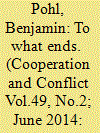

|
|
|
|
|
| Publication |
2014.
|
| Summary/Abstract |
Since the EU's Common Security and Defence Policy framework became operational in 2003, the Union has undertaken more than 20 crisis management operations. The drivers behind this activity remain debated. This article proposes a fresh interpretation based on governmental interests as defined by domestic political risks and opportunities. It argues that EU governments have tailored Common Security and Defence Policy action so as to satisfy domestic audiences. By way of illustration, this article examines the most ambitious Common Security and Defence Policy operation to date, the EU Force mission in Chad and the Central African Republic, as well as a deliberate non-intervention in a comparable case, in the eastern Democratic Republic of Congo in late 2008. By analysing the positions of the most relevant EU governments in each respective case, this article demonstrates how they corresponded to domestic political logic. Drawing on some 20 interviews with policy-makers, this article provides a theoretical account explaining the motives behind Common Security and Defence Policy decision-making rooted in original empirical evidence. The explanation for the haphazard pattern of Common Security and Defence Policy operations thus far can be found in the link between domestic politics and EU crisis management operations.
|
|
|
|
|
|
|
|
|
|
|
|
|
|
|
|
| 17 |
ID:
150105
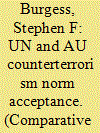

|
|
|
|
|
| Summary/Abstract |
Uganda and Chad both took risks to implement global counterterrorism (CT) norms by mounting expeditionary operations against violent extremist organizations (VEOs) because of the Pan-Africanist vision of Ugandan president Museveni and the more realist motivation of Chadian president Déby. The resources that the United States, France, and the EU have provided have enabled the two countries to execute difficult operations. Internally, both countries have worked to develop CT capacity but suffer from state weakness and the inability to raise the necessary resources to be fully able to track violent extremists, prevent VEO attacks, and arrest and try and terrorists. Uganda is ahead of Chad in developing its CT capabilities, which is a reflection of the relatively greater strength and resources of the Ugandan state. Both countries have worked with the UN and African Union in spreading global CT norms and leading by example for other states to follow. Uganda has been more active in spreading and advocating CT norms to the African Union and other bodies.
|
|
|
|
|
|
|
|
|
|
|
|
|
|
|
|
|
|
|
|
|